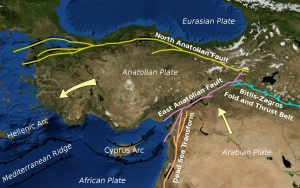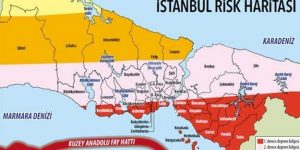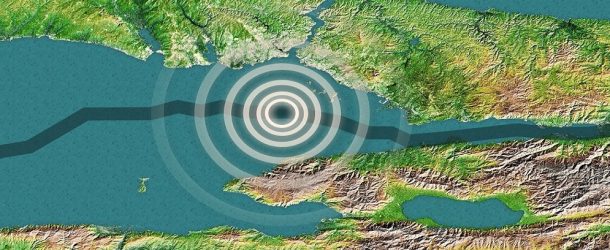Introduction
While Türkiye still trying to recover from the devastating twin earthquakes in February last year which caused the death of approximately 50,000 citizens and made 10 Anatolian cities almost fully collapse, experienced geologists in the country such as Naci Görür and Celal Şengör constantly remind people that the North Anatolian Fault or Faultline (Kuzey Anadolu Fay Hattı) is still active and will lead to a major earthquake centered close to Istanbul in the years to come. Görür claims that, according to his estimations, a major earthquake centered in Istanbul will take place sooner than 2045[1] and the probability of an instant earthquake in the city is around 47 %[2]. A television celebrity and an important scientist at the same time, Celal Şengör on the other hand soon decided to move to another city and claimed that there would be huge social problems and disasters following the most probable earthquake in Istanbul in the years to come although most of the buildings constructed according to new safety regulations following the 1999 Gölcük earthquake could resist to such a disaster[3]. Worked long years at Istanbul Technical University, Şengör also underlines that “if a major earthquake does not happen in the next 20 years in Istanbul, then we would all be very surprised”.[4] Michael Floyd, a research scientist in MIT’s Department of Earth, Atmospheric, and Planetary Sciences on the other hand claims that from an earthquake scientist’s perspective, “Istanbul is a hotspot for potential seismic hazards”[5].

Celal Şengör and Naci Görür
As the most cited and important geologists of Türkiye and many international scientists warn that a major earthquake is going to happen in a maximum 20-25 years period in the most important economic and demographic center of the country, Türkiye should have already started to make rescue and rebuilding plans in detail. However, due to the lack of coordination between the center (Presidency and the government) and the municipality (Istanbul metropolitan municipality is ruled by the main opposition party CHP’s bright young politician Ekrem İmamoğlu since 2019), the weakness of the state institutions in recent years including even the TAF (Turkish Armed Forces), historically the most sophisticated institution of the country, and people’s fatalist approaches to natural disasters, so far no real preparations are made for such a disaster scenario. More importantly, due to Istanbul’s unmatched status in the country, such a disaster could lead to serious implications in the domestic politics, economy, and foreign policy of the country as well.
Istanbul: How significant it is for the country?
To begin with, Istanbul is Türkiye’s most populated city with 16 million official residents. Istanbul is officially the place where 18.65 % of the total population resides[6]. With daily workers coming from neighboring cities, international workers and students, tourists as well as immigrants, the population of Istanbul is thought to be exceeding 20 million[7], almost one-fourth of Türkiye’s total population. But Istanbul’s significance for the country is not only stemmed from the fact that it is the most populated and popular city. Istanbul, according to official TÜİK statistics from 2021, represents more than 30 % (30.4 %) of the country’s total gross domestic product (GDP). Istanbul is where the industrial production is mainly made (around 24 %[8]), tourists visit most frequently (around 39-40 % of total tourists visiting Türkiye each year come to Istanbul[9]), and most of the taxes (44 %) are collected[10]. Moreover, with other industrial cities around such as Kocaeli and Bursa, it would not be exaggerated to claim that Istanbul represents the half of Türkiye both in terms of economic (industrial) production, wealth, and labor force. That is why, a major disastrous situation in Istanbul, which would reduce the country’s economic production and progress, will seriously weaken the country and will make it more open to geopolitical risks caused by neighboring states and terrorist organizations.
Istanbul and Earthquakes
Istanbul’s history also is an alarm bell for readers. 1509 earthquake known as the “Little Apocalypse” (Kıyamet-i Sugra) during Ottoman rule caused major social problems in addition to economic difficulties.[11] A later account of the 1509 earthquake, written in the 17th century by Solakzade Mehmed Çelebi, contended that Sultan Bayezid II told his viziers and military commanders that the earthquake had been a punishment for their failings[12]. The Ottoman Sultan even left the capital of the country for a long while due to the psychological effects of the disaster. Istanbul witnessed other major earthquakes and destruction in 1556, 1663, 1719, 1766, 1894, and 1999.

North Anatolian Fault (NAF)
Istanbul’s troublesome history of earthquakes is related to the North Anatolian Fault. The city is located directly on the North Anatolian Fault/NAF (Kuzey Anadolu Fay Hattı), between two tectonic plates. These move apart by two to three centimeters a year, over a length of 1,200 kilometers.[13] NAF runs about 20 km south of Istanbul. According to many geologists, the North Anatolian Fault is similar in many ways to the San Andreas Fault in California. This is why severe earthquakes in the region are a regular occurrence.
Potential consequences of a major disaster
Leaving up geology to geologists, as social scientists, for sure, we can still try to assess and foresee the potential consequences of such a major disaster to warn politicians, bureaucrats, and people.

Red-colored districts are risky zones for a potential major earthquake in Istanbul due to their proximity to the NAF
The first thing to be said is related to the safety of people. Thousands of old and unsafe buildings in Istanbul could easily turn into gravestones of tens of thousands of people if a major earthquake strikes the city. These buildings should be evacuated rapidly and people should be moved into safer and newly built settlements, especially in earthquake-risky districts such as Avcılar, Küçükçekmece, Bakırköy, Beylikdüzü, Güngören, Zeytinburnu, Bahçelievler, Fatih, Kadıköy, Üsküdar, Ataşehir, Ümraniye, Maltepe, Kartal, Pendik, Sultanbeyli, Sancaktepe, Tuzla, and Adalar.[14] Other than deaths and wounded people, for sure, the psychological effects of the earthquake will also be a serious problem for millions of residents in Türkiye’s economic capital.
The second important thing is related to the economy. Already in an economic crisis since the late 2010s with unending hyperinflation and constant devaluation of the Turkish lira, an earthquake that will seriously harm and slow down industrial production and economic life in Istanbul could be a deadly blow to Türkiye in terms of economics. In such a scenario, the country might become needy of foreign debt and the government might have to work with the IMF again after many years.
Thirdly, with a weakening economy, Türkiye’s ambitious foreign policy goals and undisputed redlines might be eased by the government. For instance, Ankara could start to act more in conformity with the international law in the Eastern Mediterranean regarding the Cyprus Problem and the delimitation of the maritime jurisdiction as well as economic exclusive zones. Since, in such a scenario, Türkiye will need economic support coming from the European countries and the United States, it might decide to straighten out its relations with its Western partners. Moreover, Kurdish independence in Iraq and/or in Syria might become a geopolitical reality in case Ankara is economically weakened and great powers (the U.S., the EU, the UK, Russia, and China) decide to endorse the Kurdish statehood. In such a scenario, the growing nationalist discontent in Türkiye might cause domestic problems as well.
Fourthly, although the Turkish nation showed once again its strong character in last February’s earthquakes by organizing voluntary aid campaigns to help the victimized people, a similar kind of disaster in Istanbul might cause much greater harm to the unity of the country and nation. In such a crisis, the polarization between Islamists/conservatives and seculars might rise and lead to problems of governmentality. In fact, although President Recep Tayyip Erdoğan showed a good leadership skill, the disaster of last February also polarized the country to a great extent. President Erdoğan’s political polarization tactics dividing the nation into almost two equal camps (50 % to 50 %) so far helped him to win the elections and referendums, but this might turn out to be riskier during a serious crisis. As the famous novelist and singer Zülfü Livaneli underlines, Türkiye is divided into three different groups that cannot get along with each other very well; a larger 40-50 % Islamist/conservative bloc ruling the country, a smaller 30-40 % secular bloc trying to reach the power, and 10-15 % group of Kurds and socialists defending the rights of minority groups. In addition to this classical scheme, in recent years, anti-immigrant far-right nationalism is also on the rise with the growing popularity of Zafer Partisi (Victory Party) and its ultranationalist leader Ümit Özdağ. So, all materials seem to be ready for a perfect storm that might cause mayhem and social chaos after a great disaster that will trigger social faults. During a heavy crisis, due to reactions against President Erdoğan’s immigrant-friendly and Islamist policies, similar to the failed coup d’état on July 15, 2016, there might be even efforts of some junta groups within the TAF to acquire the ruling power.
Fifthly, the social-psychological dimension of such disasters should also be taken into consideration. The 1999 Gölcük earthquake interestingly led to the collapse of the pro-secular center-right parties including ANAP and DYP and in a sense created a comfortable ground for young Islamists such as Recep Tayyip Erdoğan and Abdullah Gül to take over the governance of the country. It is a fact that Erdoğan’s rise in politics accelerated after the earthquake as many people associated the disaster as a punishment from God and blamed the old secular system. In such an atmosphere, Erdoğan’s party AK Parti (Justice and Development Party) won the elections in 2002 with 34 % of the votes. What could be the potential social-psychological effects of a similar disaster in Istanbul, I am not sure, but certainly, there will be a psychological dimension of the earthquake as well.
Conclusion
To conclude, unfortunately, the state with its bureaucratic institutions and related political bodies in Türkiye has not made so far a good preparation for the most probable Istanbul earthquake. Unfortunately, the old-fashioned security bureaucracy in Türkiye considers only terrorism, leftist movements, and separatist ethnic nationalism as a source of security risk, however, for earthquake countries like Türkiye, natural disasters are riskier and more detrimental. In that sense, following the local elections in March 2024, whoever wins the municipality of Istanbul, a serious and rapid effort of gentrification and rehabilitation should be initiated with the joint effort of the central administration and the local government. Those who do not take science into consideration and even show disrespect toward scientists are doomed to fail.
Assoc. Prof. Ozan ÖRMECİ
[1] https://sputniknews.com.tr/20230812/naci-gorur-olasi-istanbul-depreminin-tarihini-hesaplayarak-uyardi-insanimiz-olecek-1074584905.html.
[2] https://www.ntv.com.tr/galeri/turkiye/naci-gorur-istanbulda-her-an-deprem-olma-riski-yuzde-47,UwTVobuu7E2zXcrej-fX6w.
[3] https://www.cumhuriyet.com.tr/turkiye/celal-sengor-olasi-buyuk-marmara-depremi-sebebiyle-istanbuldan-tasinacagini-acikladi-2105994.
[4] https://edition.cnn.com/2023/03/17/middleeast/turkey-earthquake-istanbul-mime-intl/index.html.
[5] https://news.mit.edu/2014/seismic-gap-earthquake-istanbul-0911.
[6] https://data.tuik.gov.tr/Bulten/Index?p=49685.
[7] https://www.cnnturk.com/turkiye/istanbulun-nufus-sorunu-icin-cozum-bunu-yapmak-sart?page=1.
[8] https://www.yeniasya.com.tr/ekonomi/turkiye-nin-en-rekabetci-sehirleri-belli-oldu_509644.
[9] https://residencepermitturkey.com/turkish-tourism#:~:text=In%20the%20first%20five%20months,39.3%20percent.%E2%80%9D%20was%20said..
[10] https://www.verikaynagi.com/genel/turkiyede-vergi-tahsilati/.
[11] http://www.sbsyapi.com/tarihte-istanbul-depremleri#:~:text=Bu%20depremlerin%20her%20ikisi%20de,bir%20hasar%20g%C3%B6rmeden%20atlatmay%C4%B1%20ba%C5%9Fard%C4%B1..
[12] https://istanbultarihi.ist/396-a-seismic-cityscape-earthquakes-in-istanbuls-history.
[13] https://www.dw.com/en/istanbul-the-threat-of-a-major-earthquake/a-66590917.
[14] https://www.memurlar.net/album/17992/iste-istanbul-depremi-fay-hatti-ustunde-olan-riskli-ilceler.html#:~:text=Haritada%20fay%20hatlar%C4%B1na%20yak%C4%B1nl%C4%B1%C4%9Fa%20g%C3%B6re,Tuzla%20ve%20Adalar%20olarak%20%C3%B6ne.



















































